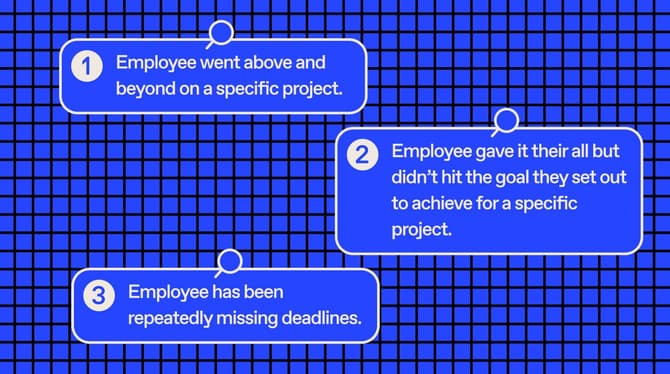Are your team members happy and fulfilled with their jobs and work conditions? Do you feel their joie de vivre as you walk around the office or speak with them remotely? If not, perhaps you sense their frustrations or stress even if they don't explicitly come out and talk to you about them.
Here, we'll talk about ways to tap into your team's feelings and get their feedback so you can help shape improved morale through your leadership.
Exclusive online summit
·
May 23 2024
Moments that matter: how to seed great work
What's in this article
The importance of employee morale in the workplace
Workplace morale refers to your employees' overall attitude and outlook. A central component of what you feel is the "vibe" at work.
Undeniably, most people want to work in places where they feel valued and challenged — and they'll actively seek opportunities to build a career in these types of conditions. Who wouldn't want these people on their team? Highly motivated employees are more engaged.
Engaged employees are great collaborators and positively influence the behaviors of those around them. They are the ones who actively contribute to creating a positive, healthy, and safe place where everyone feels valued and included.
The State of Employee Experience, from Here on Out
In contrast, suppressed morale leads employees to "check out" emotionally and may only do the bare minimum to get the job done, often while actively seeking another job. Companies with lower morale face higher turnover, taxing organizational performance and profitability.
Many internal and external factors can affect whether your team members are engaged or not.
Some common internal factors that can lower morale include:
- toxic company culture
- underworked or undervalued employees
- concerns about job security
Some external challenges may be more present in some industries than others. For example, people working in call centers face more negativity while interacting with the public than ever before, while those in tech feel increasingly isolated due to new ways of working remotely.
Employee attitudes usually spread contagiously within a workplace.
Morale goes beyond individual attitudes or personalities. Keeping a close eye on employee morale can help managers identify shifts in employee satisfaction. Once the leadership understands the issues, you can take actions to curb negativity, enhance positivity, or both.
Keeping collective morale high in a workplace is more challenging today than ever before, but it's also become essential for a well-functioning organization. High morale leads to many tangible benefits, so it's up to every manager to find ways to measure employee satisfaction.
The good news is that even taking the initiative to ask for their feedback may be enough to make employees feel like there's an improvement in communication with the management. At the very least, this can be the first step leading to high-morale workplace culture.

Questions to ask employees to improve morale
Asking employees for input about their experiences and feelings can help managers identify potential concerns. By asking questions, you gain invaluable insight into what's working and what's not and which areas need improvement to boost team engagement and morale.
Employees want to feel valued and heard, so having leaders who actively solicit advice can proactively show your team that the corporate culture is shifting to a more open and honest one.
Questions for measuring employee satisfaction
Employee satisfaction survey questions measure how happy employees are in their current workplace. Here at Officevibe, questions on satisfaction focus on the perception of fair pay, performance practices, work environment, and role.
So while asking straight-out asking, "Are you happy with your job?" may not bring honest answers, you have plenty of ways to get a general sense of workforce satisfaction from your team.
Begin with positively framed questions to find out what people like (rather than soliciting complaints). Find out what is working well!
Some employee satisfaction questions to start with might include:
- What do you like about your working environment?
- What motivates you to start your workday?
- Do you feel connected to your colleagues and team members?
- Is there anything that’s improved dramatically in the workplace since you started working or in the past year or so?
- Does everyone on the team get an even amount of work, and is anyone feeling overworked or overwhelmed?
- Do you feel like you have a clear career path forward in the organization?
💡Tip: Asking about their workload, salary, and development can all provide hints to employee satisfaction. These answers can identify areas of weakness and signs of employee attrition. They can also identify what works, and it's vital to amplify these aspects to promote a happy workplace.
Employee engagement questions
Engagement questions help identify what makes employees feel motivated and connected at work. In many cases, engagement is a better metric to measure than satisfaction, as it correlates more strongly with employees who are willing to go above and beyond their standard work performance.
Understanding what makes the work engaging can help managers identify ways to get staff more passionate about their day-to-day functions.
Here are some employee engagement questions to get the creative juices flowing:
- What makes you feel valued at work?
- Are there things that interfere with your productivity?
- Do you feel that you receive recognition for your hard work?
- Are there certain individuals that make a positive impact on the team, and why?
- When was the last time you felt challenged, and how did you feel when you overcame those obstacles?
- How do you reward yourself after a good work week? (Use this answer as a reward when the team or individual exceeds expectations)
- Does your current role use all your skills and abilities?
💡 Tip: Try to identify trends in your team based on the answers you get and amplify the aspects that most employees like. If you get a lot of negative responses about specific topics, consider ways to address these issues to improve low morale.
Want more concrete ways to up organizational morale? Use any of these 35 employee survey questions to boost engagement.
Company culture questions
A company with a positive feedback culture encourages the exchange of feedback between employees, managers, and employers. The transition to this type of culture can be challenging, but it helps companies identify challenges and streamline operations while improving employee experience.
Questions to ask to get a feel about the current company culture:
- Do you feel comfortable giving feedback to management?
- Can you think of any team-building activities you'd like to try on the next retreat?
- How does the company celebrate your team's performance?
- Would you recommend this company to another person?
- Do you feel that your feedback assists management in making decisions?
- What do you like about your manager?
- Do you feel like you're helping to achieve the company's mission?
💡 Tip: Company culture can take a lot of effort to shift and requires buy-in from everyone in the company. It's not enough to pay lip service to inputs and recommendations from employees — it requires management to engage fully with employees to build a better work environment for all.
Work-life balance questions
Many companies are starting to note that while the work environment plays a significant role in employee job satisfaction, and an even greater predictor is the employee's work-life balance. If you want employees to be happy and productive in the workplace, you need to give them enough time to recover and focus on their happiness outside the office.
It's hard for employees to regulate their balance between work and play. Almost half (48%) of American employees call themselves "workaholics."
Some questions to identify whether you might need to address potential work-life balance concerns among your staff include:
- Have you missed a personal event because of work?
- How many days in the last month have you worked overtime?
- Would offloading some of your work to a colleague reduce your stress levels?
- How much time do you spend commuting each day?
- Do you often check your work emails before work or after work hours?
- When was the last time you took work home?
- What can we do to improve your efficiency at work?
💡 Tip: Burnout can linger for months and make employees less productive. Having a healthy balance between work and life is an investment toward the future. Such a balance helps employees stay engaged and motivated for longer.
Conflict resolution questions
While managed conflict can be great for finding novel solutions and bringing teams closer together, unmanaged conflict can create massive problems within a workplace. Conflicts that take attention away from work and focus mainly on the conflict itself can dramatically impact workplace morale.
How you as a manager handle conflict can also affect morale. Improperly managed situations can escalate or lead to festering resentment that poisons the work environment.
Here are some questions to find out what your team members think about conflict resolution in your company:
- Think back to the last time you had a dispute with a co-worker. Are you happy with the outcome, or would you have done things differently?
- Can you think of conflict management solutions you'd like to see from the leadership team?
- Do you feel that you get along well with your colleagues and managers?
💡 Tip: Conflict resolution is a common managerial concern, and asking employees about their experiences can help identify potential areas of improvement.
Worsening morale questions
If you've noticed a decline in employee morale, the best thing to do is talk to the affected employees. As many employees may be reluctant to answer questions with negative answers, it's vital to approach the questions delicately and clarify that they will face no repercussions for answering honestly.
Some indirect questions may also help ease the tension, such as:
- Do you feel secure in your role in the company?
- What are the aspects of your job that you enjoy the least?
- How many days in a week do you feel negative about coming to work?
- Do you feel appreciated and respected in the company?
- Do you have the support you need after a rough day at work?
- Does the way we operate make sense? If not, what can we change to streamline our processes?
💡 Tip: Employees who feel their voice being heard are more likely to provide valuable and honest answers to questions. Since external factors can also influence employee work experience, touching base like this can identify potential methods for improving employee satisfaction.
Growth questions
Many employees start their new job feeling engaged and motivated but lose this motivation as time goes on. A large factor is feeling stagnant in one's job, an emotion that affects personal engagement and satisfaction.
Some questions to find out how employees feel about their opportunities in the company include:
- What kind of support do you need to achieve your goals?
- Do you feel like there are aspects of your current work impeding your long-term progress in the company?
- How do you track your progress on long-term goals?
- What achievements are you most proud of in the last year?
- What does career success look like to you?
💡 Tip: Understanding how your employees feel about their development is essential in gauging how employees feel about their job. Showing concern about their growth is an excellent way to improve employee morale, especially if you follow through with new opportunities for advancement.
How to monitor employee morale in the workplace
Monitoring employee morale is essential to discovering concerns before they escalate into full-blown problems. It can also help reveal positive aspects of your workplace environment, which your management can leverage to keep morale high.
Unfortunately, getting honest responses can be challenging, especially if your organization hasn't pivoted to a positive feedback culture. It's vital to use several methods to assess employee morale in the workplace and get a clear picture of the current mood.
Surveys
Employee Pulse Surveys are an excellent way to get honest, useful feedback if you develop them correctly.
Engagement surveys offer several benefits over other forms of employee questioning, including:
- Anonymity: Officevibe Pulse Surveys are set to anonymous by default. When questionnaires are set to private, they don't record any identifying information. Anonymity means that users can give honest answers without fearing retribution or pushback.
- Efficiency: Management can easily send questionnaires to the entire workforce, allowing the managers to get an overview of the entire company or target specific departments or teams.
- Speed: Pulse surveys are short questionnaires helpful in gauging the current employee mood. These monitoring tools can provide up-to-date information, making them ideal for checking the effects of any interventions.
While it's possible to construct questionnaires manually, many managers find better success with an employee experience platform like Officevibe. This platform has a variety of survey and employee feedback options that cater to various corporate cultures and environments. The Officevibe platform also captures information from previous sessions, allowing managers to track employee morale over time.
Group feedback sessions
Group sessions allow employees to provide their opinions without the intense focus of one-on-one meetings. While some people may be intimidated to speak up in a group environment, group meetings can enhance the feeling of camaraderie between coworkers.
Morale may improve as employees discover that others share their grievances or hopes for their teams. Group meetings also encourage brainstorming to find solutions to potential happiness or growth concerns. They're also a perfect place to recognize outstanding achievements and encourage teams to exceed expectations.
One-on-one meetings
One-on-one meetings between a manager and employee remain the gold standard for providing and receiving useful information about morale. These meetings become increasingly valuable as the company fosters a culture of open discussion between employees and managers.
External sites
Some employees may feel more comfortable discussing their feelings online. Sites such as Indeed and Glassdoor provide valuable insight into employees' honest feelings about their work environment.
What leaders can do next
Ultimately, the best way to boost morale starts by keeping your pulse on it. If you're sensing a drop in team spirit, that's your cue for a vibe check. The sooner you can identify any triggers causing the concerns, the quicker you can address them!
Need a hand getting these insights? Consider using one of our helpful templates like the discussion on team communication or team spirit assessment for your next one-on-one meeting.
Equip HR and managers with tools to engage, recognize, and drive performance.




